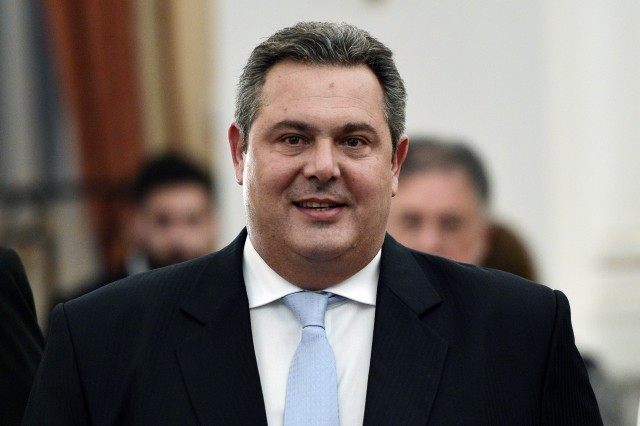As Europe plunges further into chaos following Greece’s decisive “No” vote on Sunday, the eyes of the world are on the Syriza-led Greek government. Prime Minister Alexis Tsipras and the now departed Finance Minister Yanis Varoufakis are deservedly in the centre of the spotlight.
But there is another, equally radical figure in the Greek government, who has done much to help Greece reject the EU’s harsh demands.
In government with the radical-left Syriza is the smaller conservative, nationalist Independent Greeks party, led by Defence Minister Panos Kammenos, a party that has drawn comparisons with Britain’s UKIP.
Like UKIP, Independent Greeks are a combination of disaffected former supporters of the mainstream right and members of the working class who reject mass immigration.
Kammenos is a former member of the centre-right New Democracy party and served as Shipping Minister, but grew disaffected with his party’s acquiescence to the demands of Angela Merkel, so he quit and set up his own party.
Fiercely patriotic, after forming his party in 2012 Kammenos accused the EU and IMF of turning Greece into a “laboratory animal” for an “austerity experiment”.
In an election speech, he later declared: “We will never go as beggars on our knees to Merkel, we will go standing tall as Greeks do. The Greek people are fighting united to restore national sovereignty and dignity.”
Many of their members and voters are disillusioned supporters of the centre-right New Democracy party who consider their old home too close to Angela Merkel and the “troika” of creditors. In turn, many of those who remain in New Democracy consider Independent Greeks to be either traitors or lost allies – much like the UKIP/Conservative split in Britain.
Their appeal at the last election was simple – “Syriza are going to win anyway but they won’t get a majority. Vote for us and we’ll keep them in line.” The plan worked and Independent Greeks were the only party Syriza could realistically ask to join their government.
Naturally, many in the Greek mainstream consider Kammenos and his party “extremists” and “conspiracy theorists”.
One of their more colourful demands is that Germany should pay Greece reparations for the Nazi occupation of the country during the Second World War. Germany was pardoned from having to pay compensation in the aftermath of the war in a bid to prevent resentment stirring up again as it had after the First World War.
Kammenos wants this pardon revoked.
He also faced accusations of anti-Semitism after claiming the Greek Jews paid fewer taxes, comments condemned by the Greek Board of Jewish Communities.
Syriza, their fellow radicals on the other side of the political spectrum, consider them a “necessary evil” to stay in power. Both parties are strongly anti-austerity and despite many predictions from commentators across Europe, have worked together surprisingly well up to now.
However, aside from economic issues, a vast gulf exists between the two groups. Syriza is a coalition of Marxists, Communists, Maoists and just about every other far-left faction under the sun.
Independent Greeks, on the other hand, are anti-immigration, staunchly socially conservative and have strong links with the Greek Orthodox Church. Kammenos himself is devoutly Orthodox, unlike Syriza leader Alexis Tsipras, an atheist who refused a religious element to his swearing-in ceremony in January.
This may partly explain Kammenos’s sympathy for Russia. After yesterday’s vote he declared in broken English: “I want to thank very much the Orthodox and Russian people for the support. For the support of this big country, brothers country, we feel this help.” – remarks quickly picked up by Russia’s Ruptly news agency that will no doubt be music to the ears of Vladimir Putin.
This feeling of brotherly solidarity between Orthodox nations runs deep, confusing many in the more secular Western Europe who cannot fathom how an EU state could cosy up so comfortably with Russia.
The irony is that this link with Russia is being rediscovered by the radically atheist Syriza government – partly out of necessity and partly due to the presence of Kammenos in the cabinet.
As the future of Greece becomes ever more uncertain, Kammenos and his relatively small party will continue to play a key role in government, keeping Syriza radical in economics while doing their best to prevent any left-wing changes in social policy.

COMMENTS
Please let us know if you're having issues with commenting.